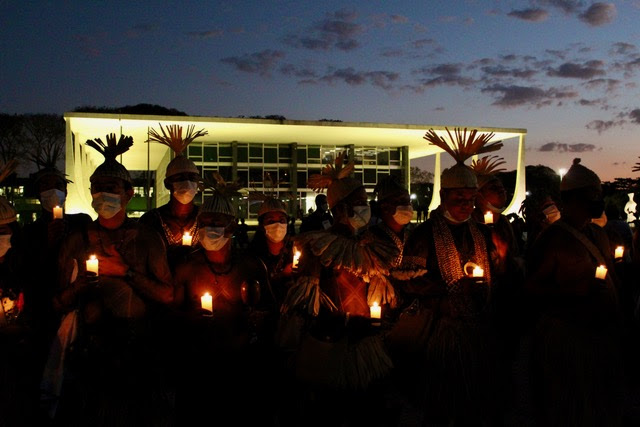
Over 6,000 indigenous people from approximately 170 peoples are protesting at the Struggle For Life camp in Brasilia against the Time Limit Trick. © Survival
Indigenous peoples from all over Brazil are protesting in a week-long action in Brasilia against the “Marco Temporal” (or “Time Limit Trick”), draft bill 490 known as the “Bill of Death”, and a series of other genocidal plans and actions by the Bolsonaro government.The “Struggle for Life” (“Luta pela Vida”) global action is led by APIB – the Association of Indigenous Peoples of Brazil.

Indigenous protestors hold a vigil in Brasilia on the night before the Supreme Court begins its vote on the Time Limit Trick. © Survival
APIB have held a vigil outside the Supreme Court, which is due to restart voting on the Time Limit Trick, a proposal put forward by the agribusiness sector claiming that indigenous peoples only have the right to territory that they were physically occupying on October 5, 1988 – the day the current Constitution came into force.
A series of actions have taken place across the globe, including in San Francisco and London, by protestors calling for an end to the genocidal attacks being waged by President Bolsonaro and his supporters against Brazil’s indigenous peoples.

Protest outside Brazilian Embassy in London on the day the Supreme Court begins its ruling on the Time Limit Trick. © Survival
The Time Limit Trick poses a threat to hundreds of indigenous territories, hundreds of thousands of indigenous people and dozens of uncontacted tribes, including:
- The Xokleng: one of their territories is the subject of the Supreme Court ruling which will judge the validity, or not, of the Time Limit Trick.
Large parts of Xokleng land and other indigenous territories were allocated to
Europeans settlers encouraged by the Brazilian government early last century. The government also financed a so-called “Indian-hunting militia”, which accelerated the colonial land grab and the genocide of indigenous peoples. The Supreme Court could now set the effects of these and subsequent evictions in stone, establishing a precedent which would have far-reaching consequences for indigenous peoples in Brazil.
-
- The Guarani: nearly all their land was stolen before 1988 and is now used for agribusiness. They would be among the hardest hit. Their campaign to get their land back, already a mammoth battle, would become even harder and bloodier.
- The uncontacted Kawahiva: their existence and location was officially confirmed after 1988, like many other uncontacted tribes.
- Many other uncontacted tribes, whose existence still hasn’t been officially confirmed by the government, despite plenty of evidence. There are 86 such cases, one of which is the uncontacted people of Ituna Itatá indigenous territory, whose emergency Land Protection Order is due to expire imminently.

Indigenous people lay out the names of indigenous territories that will be affected if the Time Limit Trick were to be passed by the Supreme Court, Brasilia, 2021. © Survival
If approved, the Time Limit Trick would set indigenous rights back decades and could wipe out whole uncontacted tribes. The indigenous movement and their allies are campaigning for it to be scrapped.
APIB said: “May the country listen to its indigenous peoples. Our lives are linked to the earth, as we live in communion with it. We are the guardians of the forests and all forms of life that live there. We are facing a Congress that continues to push its anti-indigenous agenda. We are fighting against the Time Limit Trick, scheduled to be voted by the Supreme Court on August 25th. We will resist!”
Caroline Pearce, director of Survival International said today: “This is the most critical court ruling for Brazil’s indigenous peoples for decades. The future of hundreds of thousands of people is at stake. It is also a crucial test of Brazil’s judiciary and democracy. It is up to the Supreme Court judges to uphold the constitution which recognizes indigenous peoples’ original rights to their lands as the country’s first inhabitants.”

Protesters in London stand in solidarity with Brazil’s Indigenous Peoples outside the Brazilian Embassy in London. © Suzanne Plunkett / Greenpeace










